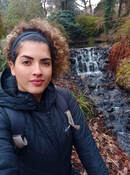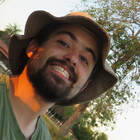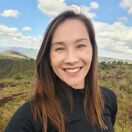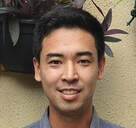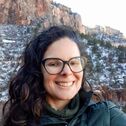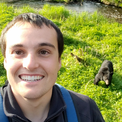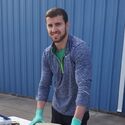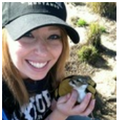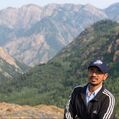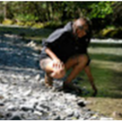|
Denis Valle. Associate Professor. Google scholar; Research gate; LinkedIn
Denis is a quantitative scientist broadly interested in problems in developing countries and Bayesian models. His work has focused on developing cutting-edge quantitative methods for ecology, conservation, environmental science, and remote sensing, typically applied to data from tropical regions. |
|
Aline Giroux. Postdocoral researcher. Google scholar; Research gate.
Aline is a quantitative ecologist interested in investigating and predicting animal movement as an evidence base to better manage biological processes and mitigate anthropogenic impacts on biodiversity. She has focused on understanding how climate and land-use changes drive animal movement patterns. At the University of Florida, she will explore long-term and high-resolution GPS data of several tropical mammal species to quantify the importance of forests as thermal shelters and predict the impacts of deforestation to mammal thermoregulation, |
|
Ismael Brack. Postdoctoral researcher.
Ismael is an ecologist interested in combining quantitative approaches with emerging technologies to study and monitor animal populations. In his PhD (from the Federal University of Rio Grande do Sul, Brazil), he explored and developed novel methods for abundance estimation and monitoring with drones. His research involved survey planning and design, hierarchical modeling and deep learning for image reviewing, focusing on South American deer. He has also worked on quantitative methods for mortality estimation by road kills and wildfires. As a typical "doble chapa" (Brazilian-Uruguayan), he is addicted to 'mate' as his main source of energy. |
|
Ana Meiga. PhD student.
Ana is a Brazilian biologist with a master’s degree in Biodiversity and Conservation from São Carlos Federal University. During her master’s she evaluated the potential impact of mammalian defaunation on the regeneration of a palm tree in the Atlantic Forest. She also participated in projects in the Amazon and Pantanal biomes. She has experience in environmental assessment and impact mitigation projects, focused mainly in medium and large mammals and railway/road ecology. At the University of Florida, Ana will focus on movement and spatial ecology and wildlife conservation. |
|
Leo Haneda. PhD Student.
Leo is a Brazilian Forest Engineer with a Masters degree in Forest Resources from the University of São Paulo. His work is focused on the use of remote sensing technologies applied to forest ecology. He has experience with satellite imagery, drone imagery and LiDAR data (3D laser scanning) focused on forest monitoring applications (e.g. forest restoration, conservation, and carbon stock estimation). At UF, his PhD will focus on combining the use of remote sensing data and statistical modelling to address problems regarding forest monitoring and climate change mitigation. |
|
Henrique Shirai. PhD Student.
Henrique is an Environmental Engineer with a Professional Masters Degree in Biodiversity Conservation and Sustainable Development from the School of Environmental Conservation and Sustainability (ESCAS). His masters research focused on identifying priority areas for restoring connectivity in the Brazilian Atlantic forest by investigating landscape dynamics. With practical experience in Geographic Information System (GIS), landscape rcology, area prioritization, Reducing Emissions from Deforestation and Forest Degradation (REDD+), restoration, and rural extension, he has actively contributed to conservation projects in the Brazilian Atlantic Forest, Pantanal, and Amazon Biomes. |
Past members
|
Tina Jackson. (former MS student).
Tina is a wildlife biologist who is broadly interested in data collection and analysis via the use of emerging technologies in support of threatened and endangered species conservation, anthropogenic and climate change impacts, and communicating science through environmental education and outreach. She obtained her B.S. from Jacksonville University and received a graduate certificate in Natural Resource Policy and Administration from UF. She has 10 years of DOD natural resource management experience and has managed terrestrial and coastal projects at navy bases all over the NAVFAC Southeast and Atlantic regions. Her thesis work will involve the development of an interactive web-based application, that will be utilized by high-school teachers to reinforce math and science concepts through forecasting of climate change impacts on selected Florida species populations. |
|
Nina Attias. (former postdoctoral researcher). Scientific coordinator at the Wild Animal Conservation Institute (ICAS).
Nina is a Brazilian conservation biologist with over 15 years of experience in ecological studies. She has a PhD in Ecology and Conservation from Federal University of Mato Grosso do Sul and a Master's degree in Ecology from the Federal University of Rio de Janeiro. Her research is in the broad area of spatial ecology applied to conservation, where she integrates behavioral ecology, spatial ecology and conservation biology to inform conservation decision making and outreach programs in the Pantanal wetlands of Brazil. She is particularly interested in the effects of habitat modification and temperature changes in animal behavior and how that affects conservation planning in a changing world. Her postdoctoral research focuses on the development and application of Bayesian methods to analyze GPS tracking data to interpret fine scale movement behavior and understand habitat permeability, using armadillos as model species. |
|
Chad Palmer. (former MS student). PhD student at Univ. of Florida
Chad Palmer is a programmer currently working in public outreach for Forest Resources and Wildlife Conservation. His background in video game design has informed his work relating scientific concepts and data to a broad variety of audiences. His work will involve public education as to how environmental policy is informed by scientific research and the various trade-offs therein. |
|
Josh Cullen (former postdoc). Postdoc at Florida State University.
Josh is an ecologist whose doctoral work focused on determining the ecological roles of sharks over ontogeny through bite force, trophic ecology, tooth morphology, and ecotoxicology. He has also studied sea turtle movement ecology in the Arabian Gulf to discern environmental drivers of spatiotemporal habitat preferences. Josh is interested in applying a variety of quantitative methods to inform the conservation and management of both aquatic and terrestrial species. Currently, he is working to develop novel Bayesian methods to analyze GPS tracking data from wildlife. In collaboration with the Fletcher Lab, this will be applied to species such as endangered snail kites. |
|
Kok Ben Toh (former PhD student). Postdoc at Northwestern University
He has more than five years of experience in coastal and marine ecology in Singapore and had co-authored papers on community and behavioral ecology. He loves playing around with data and is passionate about building statistical models to understand our ecosystem better. He’s also interested in making statistical models easily understood and accessible to the layperson, which is key to effecting changes in policy and management. |
|
Gilson Shimizu (former visiting scholar). Postoc at Univ. of Sao Paulo.
Gilson is a specialist in statistical modeling. He holds a Masters degree in statistics from Ufscar and an MBA in business administration from FGV (CEAG). He has experience in statistical modeling applied to marketing, insurance and ecology. Gilson is currently a PhD student in statistics at UFSCAR-ICMC USP with emphasis on machine learning and Bayesian inference. |
|
Rodrigo Jesus Silva (former visiting research scholar). Professor at UFRA.
I am an adjunct professor at Amazon Federal Rural University (UFRA), where I am responsible for the Ecology chair. I graduated in Biology from the Goiás Federal University (UFG) and I am earned my Ph.D. from the University of São Paulo (ESALQ/USP). I am currently doing my postdoc at the Center for Nuclear Energy in Agriculture (CENA/USP) in partnership with the School of Forest Resources and Conservation of the University of Florida (SFRC /UF). My research focuses mainly on the interface of Human Ecology, Rural studies, and Biogeochemistry, with a focus on the impacts of socio-economic development and urbanization process on traditional agroecosystems of rural communities in Brazil. I am interested in understanding the changes associated with the development process in people’s livelihood and the use of natural resources and food habits. To this end, I rely on questionnaires and staples isotopes. I am also interested in studying ecological indicators and socioeconomic results of agroforestry management in the Amazon region as an alternative to enhance the livelihood conditions of rural communities in Brazil. |
|
Jacy Hyde. (former PhD student). California Council on Science & Technology (CCST) fellow.
Jacy Hyde is a student in the labs of Dr. Valle and Dr. Bohlman as a part of the Water Institute Graduate Fellows Program. She has four years of experience with wildlife conservation and disease ecology field research across the western United States and East Africa. Her research will address the effects of dam infrastructure development on social-ecological systems in the Brazilian Amazon. |
|
Yusuf Jameel (former postdoctoral researcher). Postdoc at MIT
Yusuf is a hydrologist/geochemist whose doctoral work has focused on investigating and developing a better understanding of human-managed and human-natural coupled hydrological systems for sustainable water solutions. He combines field work with statistical analyses for his research. Currently, he is working on applying novel Bayesian mixed membership models to multivariate environmental datasets to understand the impact of global change on biodiversity, animal movement and hydrological processes. He is also interested in science outreach activities and community education. In his free time, he likes hiking, travelling and cooking. |
|
Justin Millar (former PhD student). Postdoc at Oxford University
With a background in marine and microbial ecology, he is interested in understanding human-environment interactions as they relate to disease. Currently he is working on using multiple biomarkers to model malaria dynamics in West Africa. |
|
Punam Amratia (former PhD student). Postdoc at Oxford University.
Trained as an epidemiologist, she has four years of experience in malaria public health in Africa. Her research interests target the development of predictive models for insecticide and behavioral resistance in major Anopheles species across West Africa. |
|
Pedro Albuquerque (former postdoctoral researcher). Professor at the University of Brasilia.
Pedro Albuquerque (pedrounb.blogspot.com) is Adjunct Professor at University of Brasília (Brazil) and is the leader of the Machine Learning Laboratory for Finance (lamfo.unb.br). He has worked as a researcher in the Institute for Applied Economic Research (IPEA) and as consultant for the Inter‑American Development Bank (BID) and Brazilian Administrative Council for Economic Defense (CADE). His main fields includes Econometrics, Spatial Statistics, Statistical Learning, Theoretical Inference and Probability. |
|
Joanna M. Tucker Lima (former postdoctoral researcher). Collections manager at the Montgomery Botanical Center.
Joanna Tucker Lima is a tropical forest ecologist, investigating the public health impacts of hydroelectric dams and the environmental and socio-economic changes they bring to the Brazilian Amazon. As an ecologist she is interested in better understanding the impacts of land-use change on tropical “communities” (both plants and people!) and using her skills to expose and resolve tensions between tropical forest conservation and development. |

